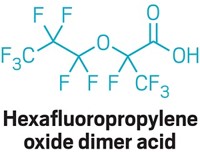Advertisement
Grab your lab coat. Let's get started
Welcome!
Welcome!
Create an account below to get 6 C&EN articles per month, receive newsletters and more - all free.
It seems this is your first time logging in online. Please enter the following information to continue.
As an ACS member you automatically get access to this site. All we need is few more details to create your reading experience.
Not you? Sign in with a different account.
Not you? Sign in with a different account.
ERROR 1
ERROR 1
ERROR 2
ERROR 2
ERROR 2
ERROR 2
ERROR 2
Password and Confirm password must match.
If you have an ACS member number, please enter it here so we can link this account to your membership. (optional)
ERROR 2
ACS values your privacy. By submitting your information, you are gaining access to C&EN and subscribing to our weekly newsletter. We use the information you provide to make your reading experience better, and we will never sell your data to third party members.
Environment
Michigan, Dow Agree On Midland Cleanup Plan
Dioxins: Dow is also offering to buy 50 properties near its manufacturing site
by Glenn Hess
February 17, 2012
The Michigan Department of Environmental Quality (DEQ) said yesterday that it has reached an agreement with Dow Chemical on the outlines of a plan to clean up to 1,500 residential properties in Midland, Mich., that are contaminated with dioxins.
In a related development, Dow said it is offering to buy approximately 50 homes and lots located within the area outlined in the proposed dioxin cleanup agreement announced by the Michigan environmental agency.
DEQ is proposing a site-specific dioxin “action level” of 250 parts per trillion for residential soils in Midland—site of Dow’s corporate headquarters and a manufacturing plant that polluted the area with dioxins from the late 1890s until the 1970s. Studies have indicated that the soil contamination downwind of the plant is a result of airborne emissions from Dow’s historic waste incineration activities.
Under the agreement, Dow will devise a detailed work plan and submit it to the state for review in March. There will be a 45-day public comment period; DEQ will also hold a public hearing in April on Dow’s proposal.
DEQ says it developed the cleanup level of 250 ppt in accordance with Environmental Protection Agency-approved risk assessment procedures and with input from the federal agency.
The total cost of the endeavor will not be known until it is determined how many of the 1,500 properties require cleaning and how much work needs to be done. Dow will cover all of the costs. Soil sampling in residential areas is expected to begin in June, according to DEQ.
“This proposed plan represents tremendous effort by the many partners gathered to address Midland’s dioxin issue,” DEQ Director Dan Wyant says. “The proposal is just the beginning of the work that lies ahead. I commend Dow officials for their commitment to the community and Michigan’s environment, and we look forward to working with them on this effort.”
Property owners will decide whether to accept Dow’s offer to clean or buy their properties. The program will also offer relocation support for those who rent their homes, if the property owner participates in the program. Property owners who choose not to relocate will be offered testing and remediation of their properties, if necessary, according to the company.
“We see this as an opportunity to address land use near our manufacturing site and give people still living in this industrial/commercial area the choice to move elsewhere,” says Rich A. Wells, vice president and site director for Dow’s Michigan Operations.
Dow has committed to purchase the 50 properties, but has not set aside a specific dollar amount, a company spokesman adds.
The announcement came just a day before EPA released a scientific assessment of the health effects other than cancer of exposure to 2,3,7,8-tetrachlorodibenzo-p-dioxin. That document, which will affect cleanups of chlorinated dioxins, furans, and polychlorinated biphenyls, was more than two decades in the making.




Join the conversation
Contact the reporter
Submit a Letter to the Editor for publication
Engage with us on Twitter